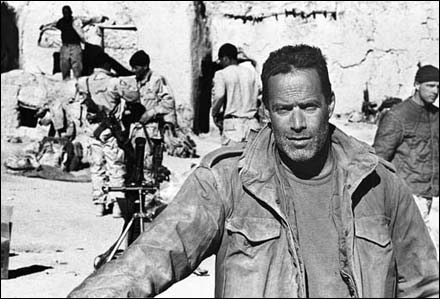
I posted a video, a review, and an excerpt of Sebastian Junger's new book, War, when he was on one of the morning shows last week. This more lengthy interview is by Jeffrey Brown, of PBS Newshour, conducted at the Aspen Institute.
Here is my commentary from the original post - on the issue of "brotherhood" among soldiers, which Junger discusses in his book.
One of the topics he looks at in the book is the ways in which men bond in the military, but especially in combat. That sense of "brotherhood" is crucial to their survival and when they are home, they miss that element of their experience.The Daily Beast had this to say about the book, and the forthcoming documentary by Junger:
It's long been said that war changes men - yet, to my knowledge, this is something that has not been adequately looked at in the psychological literature. And it also seems that each new generation experiences war in ways similar to and markedly different from their predecessors.
Men - young men in particular, with the highest testosterone levels of any humans not competing in a Mr. Olympia show - are the tools of war. We recruit them to serve, strip them of personal identity in basic training, and then reshape them into flesh and bone weapons. But, despite the military's best efforts, these are still human beings. They suffer, they fear, they get injured, and they mourn.
The greatest loss for most soldiers is not their own injuries, it's the loss of a fellow soldier, a comrade in arms, a brother. In the process of forming a unit, these men (boys, really) become a family of brothers - some you hate, some you love, some you trust, some you don't, but all the men in your unit are your brothers - and you will die for them.
That kind of brotherhood and bonding exists nowhere outside of battle, not even on a football field in the Super Bowl. The heightened emotional atmosphere of the battlefield, of searching houses, of stopping a caravan of Afghans who may or may not be Taliban - adrenaline makes emotion-laden memories much more permanent than other memories.
The question then becomes, knowing these things, how do we care for these men when they come home? How can we support them in re-integrating into their families, their communities? How do we provide some semblance of that brotherhood they are leaving behind when they come home?
Among his points: soldiers on the ground don’t think about politics–they have a job to do; war is literally intoxicating, like a cocaine high; Hollywood doesn’t understand war, at all; and at the heart of combat is love.Read the rest of the review/article.That last point is the crux of both Junger’s book, which comes out today, and the documentary film he shot and directed with British filmmaker and photographer Tim Hetherington based on the Korengal experience. The film, Restrepo, was Junger’s first, and it won the Grand Jury Prize at Sundance in January. It will be released June 25.
How does a first-time filmmaker win at Sundance? The same way he parlays his convalescence from a tree-cutting chainsaw accident in 1991 into a magazine article about one of the worst storms to ever hit the East Coast, which then becomes the best-selling book The Perfect Storm.
While Junger was laid up in Gloucester, Massachusetts, recovering from the tree injury, he got the idea to write a book about dangerous jobs. “I started getting interested in loggers, commercial fishing, fire fighting, foreign correspondents, oil well drilling. I picked out six jobs that didn’t involve guns, and that weren’t performance jobs,” he said in an interview at the time. Then, the storm hit near Gloucester and what started out as a potential chapter in a book became a book in itself.
Being nearly blown up in a Humvee, which he captured on film, was a turning point in his reporting. “I was like, fuck you. You’re not going to kill me,” Junger says.
After that, Junger became a celebrity adventure writer–and was even feted as the new Hemingway. He contributed adrenaline-filled stories on whale hunting and rock climbing to magazines like Outside and Men’s Journal. “Sebastian’s a phenomenal reporter,” says Restrepo co-director Hetherington, who also shared a Columbia-Dupont Award with Junger last year for a piece they did together on the Korengal Valley for Nightline. “He talks about so many things other journalists won’t talk about. There’s an honesty to him.”
In a sense, he’s now back to his original quest, this time writing about the far more serious job of soldiers. With War and Restrepo, Junger wanted to simply document what they go through, minus any political commentary. “What I wanted to know is, what are the emotional experiences of combat, stripped of all the macho bullshit we see in movies?” he says.
No comments:
Post a Comment